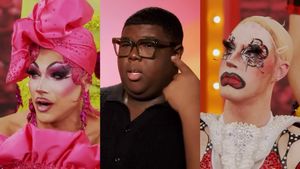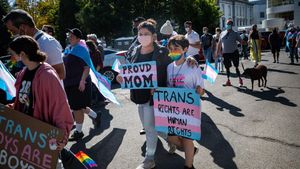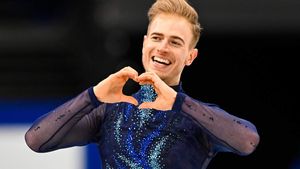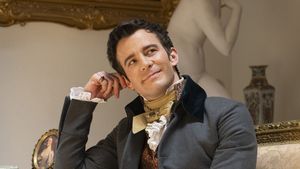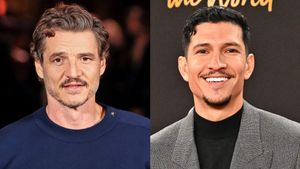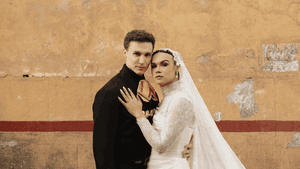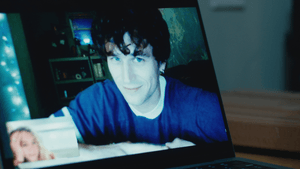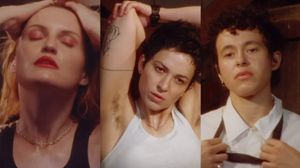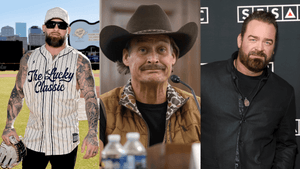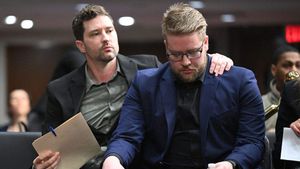 Katee Sackhoff, the breakout star of television’s Battlestar Galactica and Longmire, didn’t just join a walk or ride to raise money for HIV. She started a whole organization: Acting Outlaws, a sort of charitable biker gang that rolls into town with mufflers blaring to raise money and awareness for issues like HIV stigma and environmental destruction. (Most recently, she and Battlestar’s Tricia Helfer joined the fifth annual Kiehl’s LifeRide for amfAR, a 12-day, 1,500-mile odyssey from Wisconsin to New York City, helping to raise $170,000.) Now she’s ready to talk about her first HIV test, learning her friend was poz, what she has in common with Deputy Sheriff Victoria “Vic” Moretti (her Longmire character), and why the world would be better if a woman ran it.
Katee Sackhoff, the breakout star of television’s Battlestar Galactica and Longmire, didn’t just join a walk or ride to raise money for HIV. She started a whole organization: Acting Outlaws, a sort of charitable biker gang that rolls into town with mufflers blaring to raise money and awareness for issues like HIV stigma and environmental destruction. (Most recently, she and Battlestar’s Tricia Helfer joined the fifth annual Kiehl’s LifeRide for amfAR, a 12-day, 1,500-mile odyssey from Wisconsin to New York City, helping to raise $170,000.) Now she’s ready to talk about her first HIV test, learning her friend was poz, what she has in common with Deputy Sheriff Victoria “Vic” Moretti (her Longmire character), and why the world would be better if a woman ran it.
I was sorry to hear about your doggie passing.
It’s been the weirdest thing because he was 18 and I’ve been caring for an elderly dog now for about five years. It’s been a good portion of my life — the last few years — of caring for him and now that he’s gone.… I said to my fiancé yesterday, “I feel like my purpose in life is gone.” Like I don’t know what to do with myself, because I’ve been caring for him for so long that I’m just at a complete loss. I wander around the house, I watch TV all day. Normally, my life was by his medicine schedule.
Now everyone’s going to tell you have a baby.
It’s funny that you said have a baby because now I’m sitting here calling my fiancé going, “I think we should have a baby.” Right? Like that seems the best, you know, let’s fix one problem and just busy my life with a baby.
 Photo: Katee Sackhoff (L) and Tricia Helfer
Photo: Katee Sackhoff (L) and Tricia Helfer
I love that you’re not just a philanthropic performer, but you also started a charity organization. Tell me about the impetus behind Acting Outlaws.
Acting Outlaws really started because Tricia [Helfer] and I really have always kind of questioned what to do with the soapbox we’re given as actors. She and I had wanted to kind of really marry our love of riding motorcycles with our sort of lifelong ethical [responsibility]. So we decided, well, let’s start a company and let’s make a habit out of doing this on a regular basis. The first reason we came up with was in response to the oil spill in the Gulf of Mexico. My fiancé and her husband are both from New Orleans and we both have family ties to that region, and when the Gulf oil spill happened, it just seemed like something needed to be done. It was about seven months later and people had completely stopped talking about it, and…the problem was far from over. So we kind of decided this is where Acting Outlaws would come in; we come in and raise awareness when awareness stops. Our news cycle is so instantaneous now that by the time one thing happens, five minutes later something else happens and it is just as tragic…and our attention spans are so short that we forget. So we decided to do a motorcycle ride and raise awareness for that, and then year by year we keep doing different events to raise awareness for organizations or issues that we think need more attention.
The idea of motorcycle fundraising is really fascinating.
Yeah, we’ve had it said in so many ways, but none better than our lovely president [and founder of Kiehl’s] Chris Salgardo, who said that the great thing about motorcycles, at least the motorcycles we ride, is that they are so loud that you can’t help but pay attention to them. And it’s such a powerful metaphor when you make so much noise on a motorcycle to raise awareness and keep the attention on an issue that still needs the attention. That’s kind of why the motorcycle is such a powerful thing for us, because it is loud.
Chris just led the fifth annual Kiehl’s LifeRide for amfAR, the 12-day charity motorcycle ride. Did you get to ride the entire route?
I did not. Tricia and I met Chris five years ago, on the first ride from Los Angeles to San Francisco, and Tricia I both did that ride and just fell in love with him and who he is as a human being — he’s pretty phenomenal — and so we did that whole ride and over the next five years we both participated in each ride to some extent. But the rides that we love keep getting longer, which is more fun, but it’s hard to keep getting more days off for each ride; you’ve got to call your bosses and say, “I know we’re shooting, but I’m going to take 12 days off.” I was able to do, I think, eight days. But even if it’s just to do one day, we’ve done a portion of all of the rides.
How long have you been riding?
I started riding in 2005. I grew up in a small town where four-wheelers were kind of the norm and Tricia grew up on a farm in Alberta, so she was always around motorcycles and heavy machinery. She’s the only supermodel I know who can drive a forklift or some other kind of farm machinery that’s massive. But in 2005 we found out that my boyfriend grew up with her husband. They both rode, and Tricia and I at that point kind of took it upon ourselves to challenge each other to both get our licenses. And if anyone knows Tricia, you never make a bet with her, because she wins every time. She’s one of the most beautifully competitive people I’ve ever met — it’s one of the things I love about her. So she got her license like a month or two before me, and I was like, Oh, my God, so we’re actually doing this? I kind of thought we were just talking about it. But three months later I had my motorcycle license.
 Photo: Katee Sackhoff at the Humane Society of the United States’s 60th Anniversary Gala at the Beverly Hilton Hotel, March 29 in Beverly Hills
Photo: Katee Sackhoff at the Humane Society of the United States’s 60th Anniversary Gala at the Beverly Hilton Hotel, March 29 in Beverly Hills
When were you first of aware of HIV?
I remember watching the TV movie about Ryan White when I was a kid and not really understanding what it was. I think I was so young, I didn’t understand the magnitude of that story and how it was going to change people’s opinions about the disease. I think my first experience with it was being in the car with my dad, who was driving me to school when I was in fifth or sixth grade and he was listening to the news and we had heard that Magic Johnson had come out and said that he had tested positive. That was a weird moment because it opened up a dialogue between my father and I about so many things you don’t really talk about when you’re in fourth or fifth grade, and it gave the disease a face, because up until that point people didn’t feel like they could identify with the disease.
Absolutely.
In 2002 a friend of mine told me that he was HIV-positive, and it was a really interesting conversation because there was so much fear in the announcement and not because of the disease per se, but because of the fear that people wouldn’t love him anymore. It was one of the most interesting conversations I’ve ever had because I couldn’t understand how a person could think that this disease would make them unlovable. And I realized in that moment that not only did I need to convince him that I’d love him until the end my life, but that this disease still had so much fear attached to it and so much stigma that I realized whatever I could do to help raise awareness and funds for this disease that I would do that for as long as I could.
There’s been a rise in HIV among youth.
One of the beautiful things about people being young is that you believe that you’re invincible. It’s also one of the biggest drawbacks of youth. For most of my life we’ve been living with the knowledge of HIV and AIDS…and you see people living a full life. I think [kids] are not afraid enough of it anymore. It’s a double-edged sword because you don’t want people to be afraid of this disease, but you want them to take precautions.
 Left: Katee as Starbuck in Battlestar Galactica
Left: Katee as Starbuck in Battlestar Galactica
What was your first HIV test like?
I’ve been tested numerous times. I think as an adult, and as a person who is sexually active, it is your responsibility to get tested as much as you think you need to. If you are promiscuous and don’t use protection, I believe you should be tested as much as possible. It’s your responsibility to your next partner to have the knowledge of your own health. And so I was tested a handful of times in my life, and every time it doesn’t get easier. There’s a time when you go get tested and you start questioning all the decisions that you’ve made in your life up to that point. And you understand if you’re not making smart decisions, you could end up with a sexually transmitted disease. And then you have that waiting period where you start to think, What if? You start to make decisions like, if this is the case, this is what my life will be like, and you start to prepare for the answer…you’re scared of the unknown, you try to get a handle on it. It’s not fun. But it’s something as a sexually active person you have to do. And people don’t. They are so scared to get tested. Some people have that kind of “Well, I’d rather not know.” And that’s all fine and dandy for yourself, but if you’re sleeping with other people, it’s not OK. A lot of people live their lives with their head in the sand.
Fans really still feel connected with you from Battlestar Galactica. How does that legacy feel?
You’ve got to check your blessings, you know? I grew up in a small town and dreamed of being an actor, and you dream of it, but you never think it’s actually going to happen. So it’s fantastic. With Battlestar Galactica, people always say, “What a fantastic first job.” I wish that was my first job — that would’ve been fantastic — but I’d been acting for 10 years before that.
Ah, yes, the classic “overnight sensation” in which people have really worked for 15 years in obscurity.
[Laughs] Yeah, I’m 34 and I could actually take my pension. I’ve been in this business for a long time, so for me, I never dreamed that a show called Battlestar Galactica was going to give me my career. And not necessarily give me my career, because I’d been working steadily, but give me the career flexibility I got from the show and the ability to have choices in this business. It’s just amazing. The fan base is constantly growing; the crazy thing about Battlestar is that it has only gotten bigger since the show ended, which is a very weird thing. I have kids coming up to me that are 8 years old telling me that they love Starbuck and they love the show. I’m like, “My God, you weren’t even in the womb when we started that series!” It’s just the gift that keeps on giving.
 Photo: Sackhoff joined other TV stars at last year’s pre-Emmy event, Variety & Women in Film
Photo: Sackhoff joined other TV stars at last year’s pre-Emmy event, Variety & Women in Film
My sister-in-law lives in Wyoming and just absolutely loves you on Longmire, but your fans from Longmire are so different from your fans from Battlestar.
Oh, thank her. Yeah, it’s a completely different fan base and that’s great. Battlestar gave me the ability to choose what jobs I wanted to do, and Longmire came along and it was in perfect timing. The one thing that I’d never done was played an age. People really have never known how old I was, so it’s provided me the opportunity to go do a movie like Oculus where I have 14-year-old children and then shoot another movie where I’m playing 27. So people have no idea where I’m at. Then Longmire came and I really wanted to play normal; I’d never played a character who was like me, and so I really kind of jumped at that opportunity. And it did expand the fan base; it is a very, very, very different fan base.
Are you saying the character Vic resonates with you because you have a lot of similarities?
Not so much similarities, but I’d always played characters that were incredibly flawed and not just like normal-person flawed, like incredibly flawed and dangerous. I’ve never really played a character that wasn’t toxic. I was really looking forward to playing normal.
What’s been the best part about playing Vic?
I like wearing jeans every day. It’s nice to go to work and throw my hair in a ponytail and just kind of walk on set. I do feel like she’s kind of an everywoman. So many people can identify with her and her daily struggles, which seem so normal, and that’s kind of what I like about her.
I was so surprised that it got axed by A&E.
You know, I’m not surprised. My fiancé is a producer, he’s a movie producer, not a TV producer, but as an actor living with someone like that you’re a fly on the wall and get to learn things. Key demographics in this business are gold, and that key demo is 18-to-25 [year-olds]. Shows are won and lost and bought and sold and movies succeed or fail based on that key demo. And advertisers love the key demo because the key demo in their minds is who spends the money, so when you have a show that skews older.… I understand why a network wouldn’t find that as desirable as a show like Bates Motel that skews younger, because it’s not flashy enough in their minds for investors, for advertisers. So I’m not I’m not shocked at all. It’s the business and it sucks.
I find it baffling since the viewer numbers are good. It sounds like another network may pick it up, but if they don’t, what does that mean for you?
The same thing it always means. Longmire only shot for four months out of the year. So for the other months I was unemployed. As an actor, you are only employed if you’re working, so eight months out of the year I was unemployed. So I’m used to going out and finding work. Because of Battlestar, television is a place where I believe as an actor, I will always have a home if I want one. Perhaps not to the level of success that Battlestar and Longmire had — that’s a fingers crossed.
You battled thyroid cancer when you were younger. What did you take away from that experience that you can share with other people?
So much. I learned that you have to be your own advocate; that was one of the biggest things that I learned with our health care system. I learned that whenever you are diagnosed with something that scares you to always bring someone with you to doctor’s appointments, because they need to be your memory, because you forget everything that the doctor says. My fiancé was invaluable. Mr. Producer, he would come in with yellow notepads and take extensive notes and then we would have lunch after the appointments and he would read things back that the doctor said, and I didn’t remember anything.
That’s great advice.
The other thing I’ve learned just to stay off the Internet. The Internet is a wealth of information, but at the same time, everything is personal and nobody can speak for you and the circumstances that you are having and your future health and how something is going to affect you, because nobody knows. They can tell you what 40 percent of people felt, but that doesn’t mean it’s going to be you, and so I learned that people use the Internet so many times for negativity because they need to clear their minds and they need to get it off their chest. And when you go and you read it, it terrifies the crap out of you. So I learned to just stay off the Internet because, according to the women on the Internet, I was going to gain 40 pounds and have no energy and have no sex life and I was going to be a shell of myself for the rest my life. And I was terrified. And none of that was true. Also, therapy is invaluable. I had so much guilt about my disease because we’re in the cancer ward and everyone there was sicker than me, and there was so much guilt I had for that and I didn’t know how to handle that. And so I had to talk about it a lot, and it took years to be OK with that because I was convinced that the other shoe was going to drop at some point.
 Photo: As Deputy Vic Moretti on A&E’s Longmire
Photo: As Deputy Vic Moretti on A&E’s Longmire
I know that at least one in five women will have cancer in their lifetimes and at least 80 percent of people will develop a chronic or disabling condition in their lifetime, but often they’re invisible. How do we get people to recognize that disability is a part of all of our lives?
That’s a very interesting question because I think we actually live in a very selfish society — not necessarily negatively self-absorbed, but a very self-absorbed society. We’re one of the only countries that lives to work, and we work nonstop and we’re constantly moving, constantly trying to obtain because we are kind of programmed to think that this is the life we should want and this is the life that you have to have. So everyone is so driven that nobody takes time to acknowledge the person standing next to them to kind of have the head come out of the sand and the blinders to come off to realize that everyone around you is dealing with something in their life — and that it could happen to you. I think that we don’t stop until something happens to us. It’s such a bigger problem that I don’t know how to change society, and I don’t think anybody does. I think that’s the biggest problem: Nobody really recognizes what they have until they don’t have it anymore, or they don’t recognize the joy of not having something until they have it.
That goes back to what you’re saying earlier.
I’m a huge proponent of just honesty, complete, utter honesty, and I think that’s something we don’t necessarily value in the world because I think that we’re so judgmental and we’re so scared of things that are different that people are terrified to be honest. I don’t know how we get people to open their eyes and to want to talk about things that need to be talked about, because people are scared because everybody judges everybody. I don’t know how to change that. I just think it has to start with the children, because I don’t think we can change adults. So hopefully someday we’ll live in a utopia or our children’s children will live in a utopia where everybody’s honest and there’s no judgment and there’s none of the things we deal with now.
Don’t worry, I didn’t expect you to solve all the world’s public policy issues today.
Well, I do think, [it’d be better] if we had a woman running things. [Laughs] Sometimes my girlfriends and I joke about it, that if the world was run by a woman that things would be totally different. We would probably all cycle together, which would be really bad, but otherwise I think that there’s an honesty that women have — this desire and need to just talk that I think sometimes needs to be more the norm.
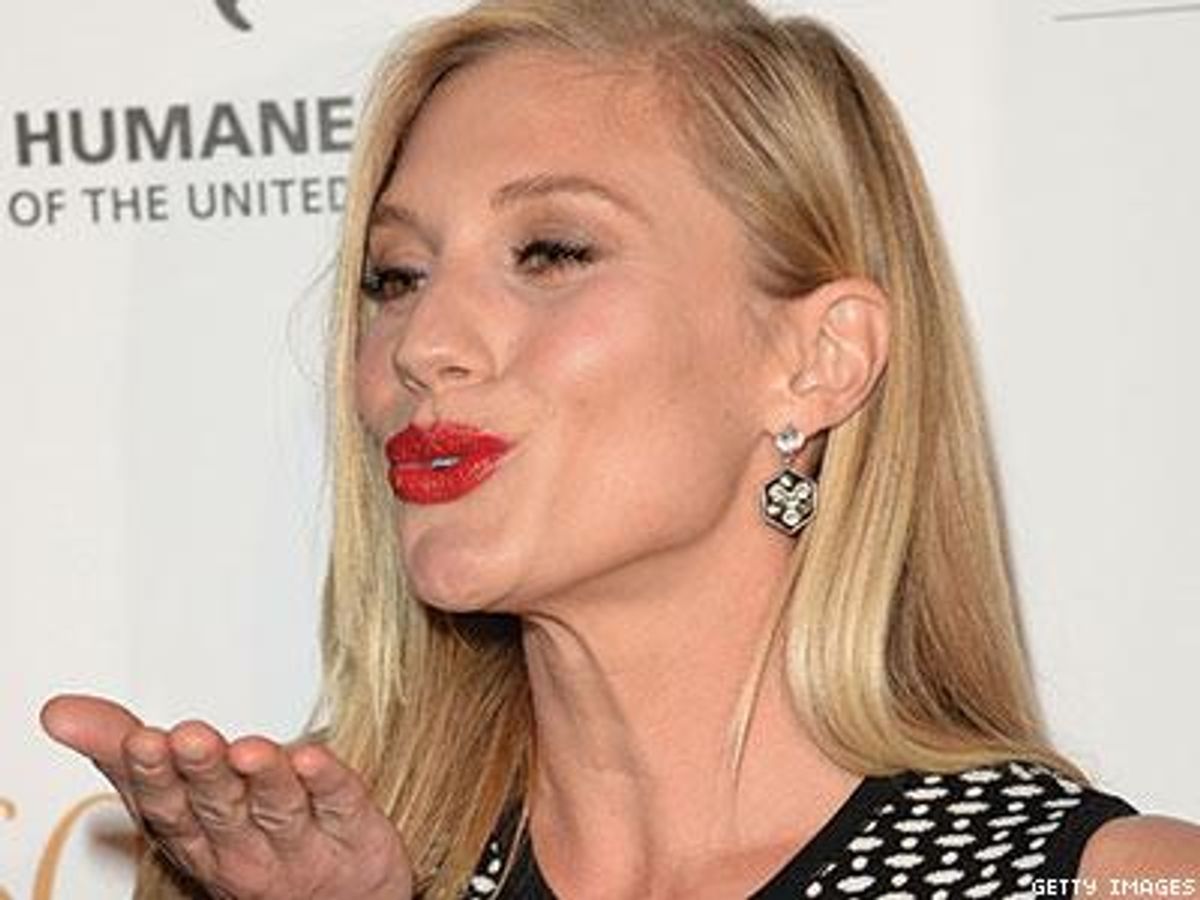
 Katee Sackhoff, the breakout star of television’s Battlestar Galactica and Longmire, didn’t just join a walk or ride to raise money for HIV. She started a whole organization: Acting Outlaws, a sort of charitable biker gang that rolls into town with mufflers blaring to raise money and awareness for issues like HIV
Katee Sackhoff, the breakout star of television’s Battlestar Galactica and Longmire, didn’t just join a walk or ride to raise money for HIV. She started a whole organization: Acting Outlaws, a sort of charitable biker gang that rolls into town with mufflers blaring to raise money and awareness for issues like HIV  Photo: Katee Sackhoff (L) and Tricia Helfer
Photo: Katee Sackhoff (L) and Tricia Helfer Photo: Katee Sackhoff at the Humane Society of the United States’s 60th Anniversary Gala at the Beverly Hilton Hotel, March 29 in Beverly Hills
Photo: Katee Sackhoff at the Humane Society of the United States’s 60th Anniversary Gala at the Beverly Hilton Hotel, March 29 in Beverly Hills Left: Katee as Starbuck in Battlestar Galactica
Left: Katee as Starbuck in Battlestar Galactica Photo: Sackhoff joined other TV stars at last year’s pre-Emmy event, Variety & Women in Film
Photo: Sackhoff joined other TV stars at last year’s pre-Emmy event, Variety & Women in Film Photo: As Deputy Vic Moretti on A&E’s Longmire
Photo: As Deputy Vic Moretti on A&E’s Longmire






























